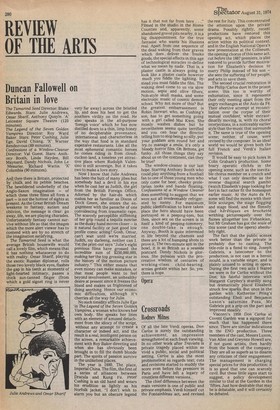Duncan FaHowell on Britain in love
The Tamarind Seed Director: Blake' Edwards. Stars: Julie Andrews, Omar Sherif, Anthony Quayle. 'A' Leicester Square Theatre (125 minutes).
The Legend of the Seven Golden Vampires Director: Roy Ward Baker. Stars: Peter Cushing, Julie Ege, David Chiang. 'X' Warner Rendezvous (89 minutes). Confessions of a Window-Cleaner Director: Val Guest. Stars: Anthony Booth, Linda Hayden, Bill Maynard, Dandy Nichols, John Le ' Mesurier, -Richard Wattis. 'X' Columbia (90 minutes).
Ana then there is Britain, protected b' chalk, and its pebble beaches. The bewildered underbelly of the Anglo-Saxon imagination — of which these three films all form a part — is not the hottest of sights at present. As the Great British Dream weakens to fantasy, autism and oblivion, the message is clear: go away, life, we are playing charades. Unfortunately fantasy cannot survive without life so that the images which the more alert viewer has to contend with are by no stretch of the imagination satisfying.
The Tamarind Seed is what the average British housewife would call a lovely film, which means that it has nothing whatsoever to do with reality. Omar Sharif, playing the exotic Russian diplomat, rolls those two lovely black eyes, flashes the gap in his teeth at moments of light-hearted intimacy, passes a thick sun-tanned finger (from which a gold signet ring is never very far away) across the bristled lip, and does his best to get the southern virility on the road. He also speaks in the all-purpose 'foreign voice' which he has now distilled down to a thin, limp honey of no decipherable provenance, international and characterless in the way that food is in standard expensive restaurants. Like all the most ephemeral romantic heroes he comes riding in from cloudcuckoo land, a toneless yet attractive place where Rudolph Valentino is still sovereign. But it takes two to make a love story.
Now I know that Julie Andrews has been the butt of many jibes but somebody had a devil in his eye when he cast her as Judith, the girl from the British Foreign Office. Adorned by the hair-do which makes her as familiar as Dixon of
Dock Green, she enters the engagement 'with the panache of one convalescing from traumatic, rape. The scarcely perceptible stiffening of her grip round a tequila sunrise as the dusky hand moves closer — is it natural facility or just good low profile comic acting? Gosh, Omar, can't wait until we're married. Judith, my darleeng, neither can I. Yet the print-out says "Julie's eight previous films have grossed the incredible sum of $250,000,000, making her the top grossing star in the history of the motion picture industry." This either means that even money can make mistakes, or that most people want to feel beyond involvement, an unhealthy desire at present since it freezes the blood and makes us frightened of doing anything. Hence our economic difficulties, although it's cherries all the way for Julie.
No such timidity afflicts Julie Ege in The Legend of the Seven Golden Vampires, a woman who knows hef own body. She speaks her lines with an element of amused detachment from the idiocy of the script, without any attempt to create a character or indeed act, and the result is a real, intelligent person on the screen, a remarkable achievement with Roy Baker directing and when she has obviously been brought in to fill the dumb blonde part. The spirits of passion survive in the unlikeliest places.
The year is 1880.. The place, Imperial China. The film, the first of a series of alliances between Dracula and Kung Fu. Peter Cushing is an old hand and wears his erudition as lightly as his Norfolk jacket. "I don't wish to alarm you but an obscure legend has it that not far from here . . ." Filmed in the studio in the Home Counties and, apparently, some abandoned gravel pits nearby, it is,a big disappointment for the true Fantasist who wants his illusions real. Apart from one sequence of the dead waking from their graves which does deliver the freako goods, the special effects in this age of technological miracles re-define what we mean by nadir. That is, a plaster castle is always going to look like a plaster castle however much you fiddle the lighting. Iistead you must fiddle the film. The waking dead come to us via slow motion, sepia and olive filters, Noh-style skull masks, and some electronic music of cosmic demon school. Why not more of this? But the greatest embarrassment is Robin Stewart who, as Cushing's son, has to get something going with a girl called Mai Kwei. She mostly washes dishes but he nevertheless seems quite terrified and you can hear the director telling him to stop being so silly, put your goddam arm round her and try_to manage a smile, it's only a bloody horror film. Oh Britons, get funky. All those things they say about us on the continent, can they be true?
The window-cleaner is our last hope. Starring Anthony Booth who could play anything from a football fan to one of those young men who only come for beer, cheeky proletarian looks and hands floating, Confessions of a Window Cleaner does something to suggest that we were not all irredeemably refrigerated by nanny. For maximum, public identification to have taken place the hero should have been portrayed as a peeping-tom, but then, since sex on the screen is in itself a kind of peeping-tornrnery, one double-take is enough. Anyway, Booth is quite interested in life beyond the chamois and there are a lot of humping shots to prove it. The two-minute spit in the bowl, it is as British as a seaside postcard. Dandy Nichols is glorious. She pulsates with the procreative wisdom of centuries of working-class child-bearing, armies gestate within her. So, yes, there is hope.


































 Previous page
Previous page